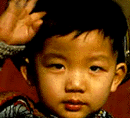Tietou’s (Xiaoman Chen) young life has been affected by China’s political climate from the moment of his birth. His mother, a schoolteacher named Chen Shujuan (Liping Lu), and his father, a librarian named Lin Shaolong (Quanxin Pu), were compelled to delay their wedding plans out of reverence for the death of Joseph Stalin, and his mother often remarked that his birthday would have occurred earlier had it not been for the postponement. Affectionately nicknamed Tietou or “iron head” by a neighbor’s grandmother, the moniker seems appropriate for the stubborn, mischievous, trouble-prone boy, as young Tietou (Wenyao Zhang) invariably finds himself ruining his uncle’s homework, breaking the window of a neighbor’s house, or fighting in playground scuffles. The Blue Kite follows Tietou’s life through the three father figures in his life. The film opens to the early 1950s, and the country is in the midst of the Rectification Movement, as people are encouraged to assess their work environment and suggest areas of improvement to their leaders. However, as the suggestions prove to be radical and highly critical of existing policy, the distinction between constructive criticism and subversion become blurred. When Shaolong’s workplace is deemed non-proactive in their rectification efforts based on a quota established by the government, the library is tasked to submit a name. An ill-timed trip to the bathroom seemingly singles out Shaolong for reeducation in a remote camp, where he later suffers an untimely death a few days before his return home. Compelled by a sense of duty and responsibility to his friend’s family, Uncle Li (Xuejian Li), then returns after serving time at a reeducation camp to provide assistance to the financially struggling Shaolong and Tietou. It is the time of the Great Leap Forward movement, as collectivization of farms and communal kitchens are established throughout the country, and citizens serve the state through participation in agricultural work camps in order to increase productivity. But as the government’s overambitious goals continue to be unrealistic, and a widespread food shortage looms over the country, Uncle Li also becomes a victim of political tide, as he falls ill from malnutrition and overwork. In an attempt to provide a better life for Tietou, Shujuan accepts a marriage proposal from a military officer, a pensive, mild-mannered intellectual named Lao Wu (Baochang Guo). But as the Cultural Revolution becomes increasingly turbulent and hostile towards established scholars, Lao Wu’s academic ties lead to political disfavor and public denunciation.
Tian Zhuangzhuang creates a poignant story of lost innocence, political turmoil, and personal courage in The Blue Kite. The opening image of the soaring blue kite provides a figurative continuity through the uncertainty of Tietou’s own young life, as the tradition of flying a kite is passed down to a younger generation. (Note how a variation of the childhood tradition is adopted by Uncle Li through a New Year’s Eve paper lantern.) Furthermore, the kite serves as a pervasive (and tranquil) contrast to the repeated image of the inciting red flags and banners that punctuate each wave of uncertainty caused by shifting government policy. The final shot shows a tattered kite caught between the branches of a barren tree, waving in the breeze. It is a symbol of resilience in the face of unending hardship and increasing disillusionment – an incongruous portrait of transience and tenacity – a haunting reminder of the unseverable bonds of humanity and family.
© Acquarello 2001. All rights reserved.
